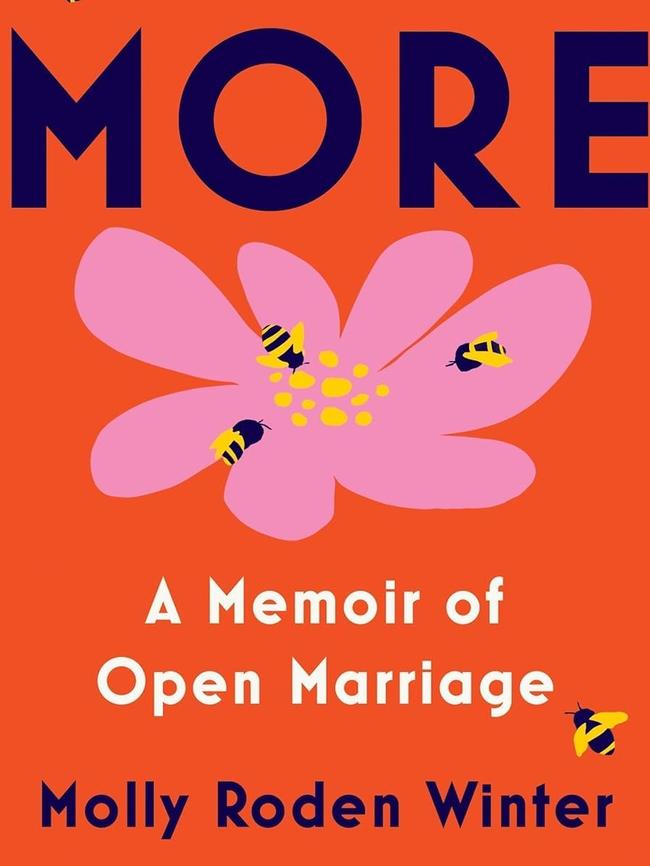Polyamory sounds as boring as a plate of parsnips
More: A Memoir of Open Marriage reads like a woke parody of a suburban relationship – so white it glows in the dark, humourless, unromantic, and fatally self-indulgent.

Molly Roden Winter, the Brooklyn-based whiner responsible for More: A Memoir of Open Marriage, did not intend to make polyamory sound as exciting as a platter of boiled parsnips. She has been earnestly spouting the usual poly rhetoric to anyone who will listen for several years now. I am not convinced.

The narrative here is straightforward. Mother of two young children resents her comparatively freewheeling – and mostly absent – composer husband. She feels like a “Wiper of Noses, the Doer of Dishes, the Nag in Residence”, sucked clean of pretty; her breasts are “mottled with stretch marks, two semi-deflated balloons”. One night, she storms out to a bar and meets an attractive man. On her return, the husband suggests a timeshare. Why didn’t she bang him? he asks. He begins pressing for an open marriage. “I like imagining you with other men,” he tells his fretful, attention-starved wife. “It’s part of what turns me on.”
Alarm bells failed to ring for Roden Winter when, early in their relationship, husband Stewart took her to a “seedy” sex club (“I’m remembering the two hookers in the ladies’ room who talked about their hopes for the evening: that the johns who’d brought them there would take them to McDonald’s,” she writes). A more perceptive woman may have wondered if this was his way of saying that he was sexually bored by her.
“Baby”, he schmoozes her, in the tradition of all philanderers who have trouble remembering their lovers’ names. “Oh, baby.”

While Roden Winter “liked walking around” the sex club with her breasts exposed, she “didn’t like the feeling of being an interchangeable body”. Despite this, she later agreed to regularly engage in “really shitty sexual experiences” in order to attract her husband’s attention.
Reality only occasionally penetrates her masochistic fug. “It’s like I’m just reacting to what men want,” Roden Winter tells her therapist. “I’m not asserting myself at all. And getting attention, having sex – it feels good but it’s so temporary. Then afterwards, I feel like shit. Sorry – I mean, afterwards, I feel empty.”
When one lover suggests a ménage a trois with his partner, Roden Winter complies not because it thrills her, but “because it feels like a requirement for dating” him. To this end, she puts on “the sunniest smile I can muster and tell Stew the same lie I’m telling myself: ‘All right, I’ll enjoy myself!’” In short, the same lie she tells herself every day of her life.
Again in her therapist’s office, Roden Winter thinks: “I am using every bit of force I can muster to keep up the illusion of functionality to my children, to the outside world. Stewart, however, is privy to the truth, and this is important to me. He needs to know that I’m wrecked. Finished.” Turning to her therapist, she says, “We’re here because I don’t want to be in an open marriage anymore. But Stewart does.”
What Stewbie wants, Stewbie gets, it seems.
Roden Winter takes 300 pages to justify her subordination to her husband as “progressive”. Addressing her husband as if she were the grovelling acolyte and he, the strict and benevolent guru, she describes his kisses as “let(ting) me know that (he) is in control, that all I have to do is give myself over to him, follow him into whatever comes next, and all will be well.”
This Victorian dynamic – marketed by the publisher as the “journey of a woman becoming her most authentic self” – is not only pitiful but profoundly disturbing.
Having lost interest in a potential lover after a failed date, Roden Winter notes that her husband works hard “to keep the fantasy of Matt alive.” Doing so “feeds” his libido. “When he tells me to imagine what Matt’s cock looks like, how his mouth would feel on my pussy, Stew gets rougher than I want him to be. Once, he calls me c..t during sex, and I start to cry. ‘Are you mad at me?’ I blubber.”
In 2024, then, it is considered “progressive” to effectively apologise – in the words and with the mien of a child – to one’s husband during sex for feeling traumatised when called a c..t, for being treated roughly, and for feeling sidelined by his self-serving sexual fantasies.
“It’s like having a front-row seat for porn,” Stewart explains. In reply, Roden Winter nods, “mute, tears rising” and blinks them away.
Roden Winter justifies exposing herself to potential violence at the hands of random partners, to sexually transmitted diseases – one lover makes a point of not wearing condoms – and to sustained spiritual trauma as necessary in order to “reclaim” her life. Such abuse is, by her, rebranded as emancipation, as women – she has emphasised this in interviews – cannot be expected to “give themselves up to motherhood forever”.
But where is this motherhood that swallows her alive? Roden Winter’s children are barely mentioned in the book, and almost always in the context of duty rather than love. “I’ve worried that I’m not spending enough time at home, enough time with my children …” she writes. “Still, I sidestep the question. In other words, I lie.”
Like all submissive women, Roden Winter’s life revolves around her dominant partner.
The absence of grace in the book would, perhaps, be easier to forgive were it a titillating odyssey of erotic chaos. Unfortunately, Roden Winter has all the sensual allure of margarine. “The idea of wearing a butt plug for twenty-four hours is about as appealing as getting my appendix pierced,” she writes. “But knowing that some people treat their plugs like a comfy pair of slippers has piqued my curiosity. And after a few attempts, it’s in.”
More: A Memoir of Open Marriage reads like a woke parody of a suburban relationship – so white it glows in the dark, humourless, unromantic, and fatally self-indulgent.
Critically, did anyone really need a new take on the use of human beings as masturbatory aids?
Antonella Gambotto-Burke’s take on love, relationships and sex can be found in Apple: Sex, Drugs, Motherhood and the Recovery of the Feminine.




To join the conversation, please log in. Don't have an account? Register
Join the conversation, you are commenting as Logout